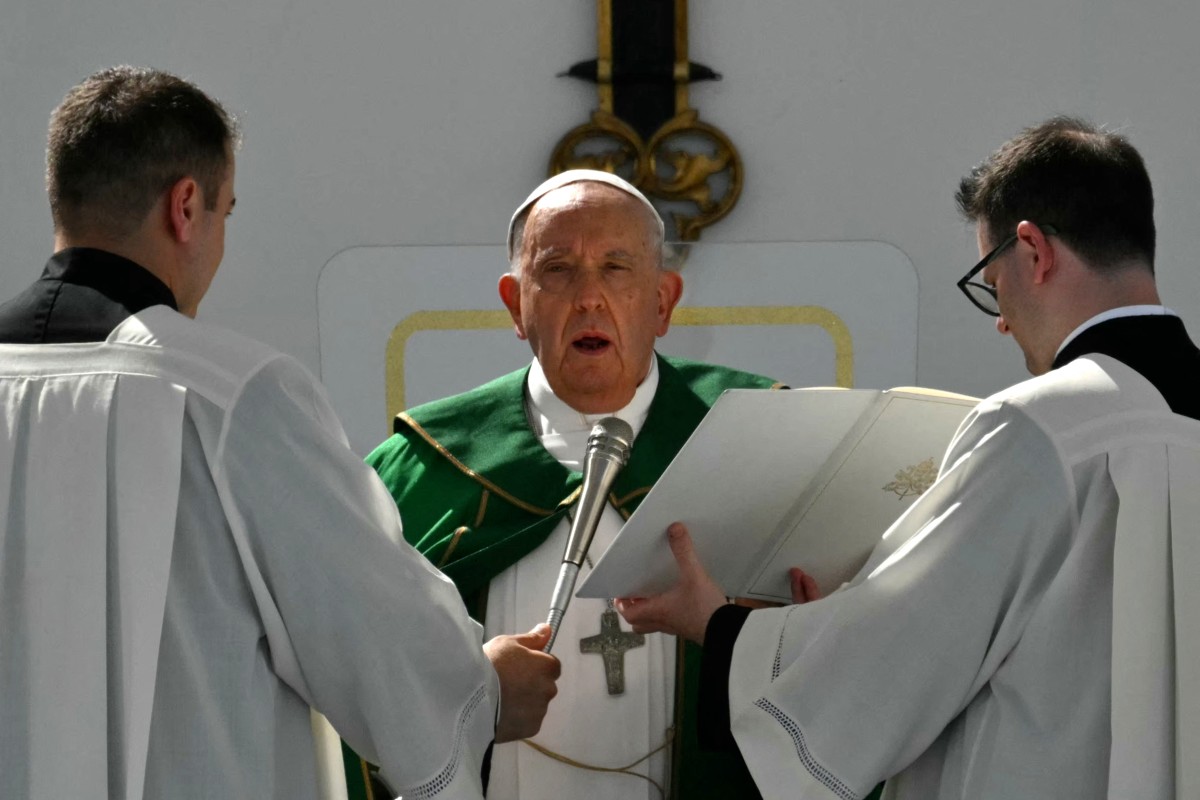In the face of a sometimes “anesthetized,” consumerist society, we must recall the “scandal” of our Christian faith — that God became man and dwells in each of us, especially the weakest, Pope Francis said in the northern Italian city of Trieste on Sunday.
“We need the scandal of faith,” the pontiff said at a Mass on July 7. “A faith rooted in the God who became man and, therefore, [is] a human faith, a faith of flesh, which enters history, which touches people’s lives, which heals broken hearts, which becomes a leaven of hope and the seed of a new world.”
At the Mass for approximately 8,500 people in Unità d’Italia Square, next to the Port of Trieste, Francis said Catholics need “a faith that awakens consciences from slumber, that puts its finger in the wounds, in the wounds of society … a restless faith that helps overcome mediocrity and sloth of the heart, [a faith] which becomes a thorn in the flesh of a society often anesthetized and stunned by consumerism.”
Pope Francis celebrated the Mass during a half-day visit to Trieste for the closing of the 50th Social Week of Catholics, an annual event organized by the Catholic Church in Italy dedicated to promoting Catholic social doctrine. The theme of this year’s meeting, which had about 1,200 participants, was democracy.
After addressing attendees of the July 3–7 congress at a nearby conference center, the pope rode a golf cart to a sunny Unità d’Italia for the Mass, which he concelebrated with almost 100 bishops and 260 priests.
Before Mass, he greeted a 111-year-old resident of Trieste named Maria, according to the Holy See Press Office.
Reflecting on God’s humanity in his homily, the pope said: “[God’s] presence is revealed precisely in the faces hollowed out by suffering where degradation seems to triumph. The infinity of God is hidden in human misery, the Lord stirs and makes himself a friendly presence precisely in the wounded flesh of the least, the forgotten, the discarded. There the Lord manifests himself.”
“And we, who are sometimes unnecessarily scandalized by so many small things, would do well instead to ask ourselves: Why, in the face of evil that is rampant, life that is humiliated, the problems of labor, the sufferings of migrants, do we not become scandalized?” he said.
The Social Week of Catholics was held in Trieste, a port city located on a narrow strip of Italian territory in the country’s far northeastern point, nestled between the Adriatic Sea and Slovenia, with Croatia’s border nearby.
The position of the city has made it a common arrival point for migrants coming to Europe through the Balkan migratory route.
In its annual report, an aid group noted a worrying rise in migrant children arriving in the city.
According to the International Rescue Committee, approximately 3,000 unaccompanied children arrived as migrants in Trieste in 2023, a 112% increase from the previous year.
The group says in 2023, they met and provided aid to a total of 16,052 people who arrived at the Trieste train station through the Balkan migratory route. Roughly 68% of the migrants were from Afghanistan.
“Continue to commit yourselves to the front lines to spread the Gospel of hope, especially to those coming from the Balkan route and to all those who, in body or spirit, need encouragement and consolation,” Pope Francis said in his homily July 7.
Earlier in the morning, Francis met briefly with a group of about 150 migrants and people with disabilities.
The pope also remembered prisoners in his reflection. Trieste made headlines earlier this year due to dire overcrowding in the city’s main prison.
“Why do we remain apathetic and indifferent to the injustices of the world?” the pontiff asked. “Why do we not take to heart the plight of prisoners, which even from this city of Trieste rises as a cry of anguish? Why do we not contemplate the miseries, the pain, the discard of so many people in the city? We are afraid, we are afraid to find Christ there.”
At the end of Mass, the pope led those present in praying the Angelus, as he does every Sunday. Before reciting the Marian prayer, he referenced Trieste’s welcome of immigrants.
Trieste “is an open door to migrants — and to all those who struggle the most,” he said.
“Trieste is one of those cities that have the vocation of bringing together different people: first of all because it is a port, it is an important port, and then because it is located at the crossroads between Italy, central Europe, and the Balkans,” Francis noted. “In these situations, the challenge for the ecclesial and civil communities is to know how to combine openness and stability, welcome and identity.”
After Mass and the Angelus, Pope Francis boarded a helicopter for the Vatican from the nearby Audace Pier. He arrived at the Vatican just before 2 p.m., according to the Holy See Press Office.







